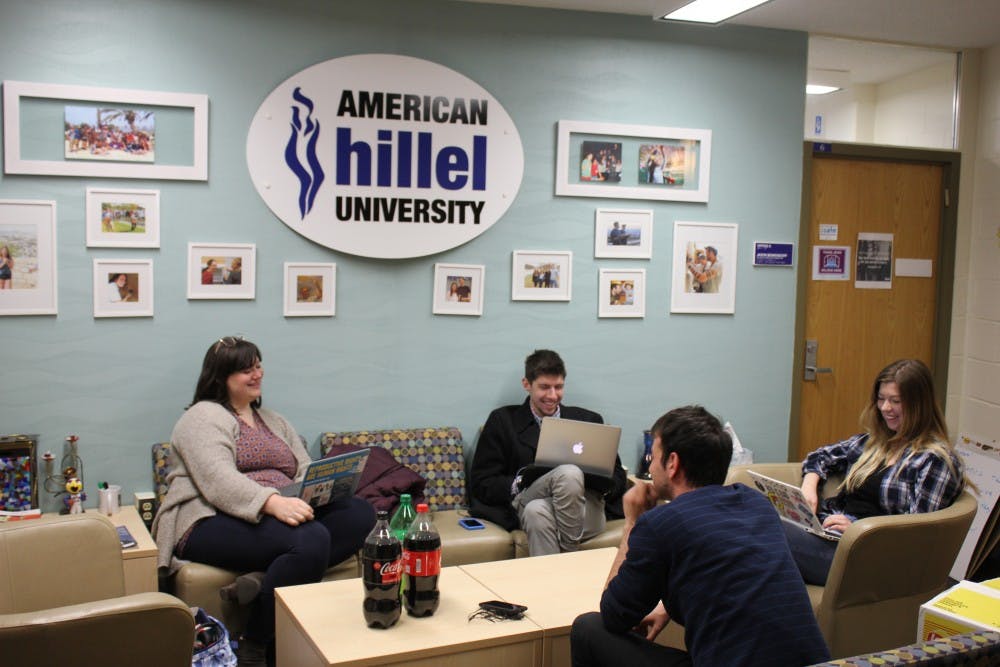On February 27, American University Police Department officers removed anti-Semitic posters from campus. The flyers contained the hashtag, #AIPACgohome, and an Operation Homeland logo. The Eagle spotted the flyers on the School of International Service building at about 2 a.m.
First, The Eagle strongly affirms its support for the Jewish community at American University.
The posters addressed AIPAC, the American Israel Public Affairs Committee. AIPAC is a large bipartisan, pro-Israel organization. Beginning last Sunday, more than 18,000 pro-Israel supporters attended the conference, according to the event’s website. Many of them are Jewish.
A critical observation of the posters, however, reveals they offer a targeted, hateful anti-Semitic message disguised by anti-Israel sentiment. The University has a large Jewish population. Twelve percent of the University's class of 2022, for example, identifies as Jewish, according to a breakdown provided by the Kay Spiritual Life Center. The posters, which list the name of a group of white supremacists connected with Richard Spencer, clearly target Jews and not exclusively Israel.
As these events happen, it seems that the University’s response and consequently the student community response decreases. Formerly, hateful events like these -- such as the Confederate flags hung on campus in September -- elicited town hall community meetings. But, no longer does that seem to be the case. In an interview with Fanta Aw, vice president of campus life, The Eagle learned that the University’s primary strategy is to deny attention to white supremacist groups hanging posters like these. They do so with the advice of the Anti-Defamation League.
Our staff agrees that the University should deny oxygen to white supremacist groups. Town halls, for example, provide too much attention to these groups. We also look forward to learning more about anti-Semitism through University-hosted seminars.
However, the school has not been transparent about this shift away from town halls. They did not publicly announce why they neglected to host a town hall after the anti-immigration posters were hung in January and after the anti-Semitic posters were hung in February. In the case of the anti-Semitic posters, the University opted to host discussions on anti-Semitism instead of a town hall. Publicly, however, the University produced a rapid, cookie-cutter memo after the anti-Semitic posters were hung. This only reinforces the image of an administration that is disconnected from the student body. Through our reporting, The Eagle knows that the
University is acting on anti-Semitism behind the scenes and has published that information. However, the school is not publicly communicating their actions clearly.
This can make Jewish students feel undervalued because it seems like the University isn’t taking bigotry against them as seriously as other forms of hatred. In the coming weeks, we hope the University will publicly explain the criteria for a town hall meeting and what makes this particular anti-Semitic postering (in addition the anti-immigration posters) different to the student body. We also hope they will further explain their strategy to deny these white supremacist groups the attention they seek.
Additionally, students feel left out of decision-making discussions, treated solely as assets rather than active members of change in the community. Jewish community members should be consulted on how the University moves forward from these anti-Semitic posters. Jews are as worthy as any other marginalized group of the University’s attention.
The Eagle recommends that University improve its communication with the student body, specifically the Jewish community, about their approach to anti-Semitism and white supremacist postering as a whole. They could do so through face-to-face conversations with students. Burwell recently wrote, “It truly takes a village to build a more inclusive community.” These events are no exception. It is time to include more student voices in the building process and be transparent with your actions.
-E
opinion@theeagleonline.com





